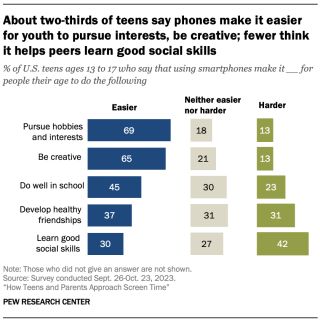- New research shows that teenagers feel positive emotions when they unplug.
- Most teens do not limit their social media or smartphone use.
- Parents and teens are equally likely to say they argue about phone use.
.jpg?itok=j4pMzZIj)
Every year I challenge students—seventh graders—to go on a “screen vacation.” This means they have to avoid all screens for at least 24 hours, and write a short essay about their experience going offline.
When I first assigned this activity for homework over a decade ago, students were excited about the prospect of unplugging. But in the ensuing years, enthusiasm for this assignment has waned significantly, with some students even suggesting it is “illegal” for me to assign such cruel homework.
However, the essays students hand in when this “cruel” assignment is over tell a different story. Nearly every student writes that they “feel peaceful” or “relaxed” or “less anxious” away from their screens. And many implore me to “assign this homework again.” The essays always remind me that this generation simply does not know a world without the distraction of devices, and that providing them an example of such a world is truly the “vacation” they need.
New Research Concurs
In a new survey published Monday by the Pew Research Center, nearly three-quarters of U.S. teens say they feel happy (74 percent) or peaceful (72 percent) when they are away from their phones. Smaller percentages equate not having their phone with negative emotions. For example, teens say not having their phone at least sometimes makes them feel anxious (44 percent), upset (40 percent), or lonely (39 percent).
Even though teens report feeling positive emotions when they are away from their phones, only 38 percent say they spend too much time on them. Over half say that the amount of time they spend on their phone (51 percent) or on social media (64 percent) is just right. Only four in ten teens (39 percent) say they have cut back on social media. A similar share say they have cut back on their phone use (36 percent).

Source: Pew Research Center
Teens Experience Benefits Online
Despite the increasing concerns and awareness teens have about how the time they spend on their devices makes them feel, seven in ten report that smartphones provide more benefits than harms for people their age, while a smaller share (30 percent) take the opposite view, saying there are more harms than benefits.
Most teens say smartphones make it easier to pursue hobbies and interests (69 percent), to be creative (65 percent), and to do well in school (45%). Roughly four in ten teens also say smartphones make it easier for them to develop healthy friendships, while only 31 percent say they make it harder or neither easier nor harder. However, teens do think smartphones make learning good social skills harder (42 percent) rather than easier (30 percent).
What About Parents?
About half of parents (47 percent) say they spend too much time on their phone. Just five percent think they spend too little time on it, and 45 percent believe they spend just the right amount of time.
But nearly half of teens (46 percent) tell a different story. They say their parent is at least sometimes distracted by their phone when they’re trying to talk to them, with eight percent reporting that this happens often.
Other Takeaways
- Half of parents say they have looked through their teen’s phone.
- Roughly three-quarters of parents (76 percent) say managing how much time their teen spends on the phone is an important or top priority.
- About four in ten parents and teens report regularly arguing with one another about time spent on their phone.
What It All Means
Clearly, parents and teens are all spending a lot of time on their devices. This much is probably not going to change any time soon. However, it is an encouraging sign that teens are recognizing how their devices make them feel, and what the benefits are (or can be) when they use them. It is important to recognize and encourage this empowerment and agency that teens have over their devices. We can encourage it by teaching teens about the persuasive technologies companies use to capture and hold onto their attention, and remind teens what they can do to gain back their time (like setting their own limits, blocking unwanted content, being selective of the apps they use, and knowing when to walk away). Having parent/child technology use agreements in place (like this one) can be helpful too. And, judging by the research, parents could benefit from implementing some of these strategies to better manage their own screen time too.
References
Anderson, Monica, et. al., “How Teens and Parents Approach Screen Time,” Pew Research Center, March 11, 2024.
